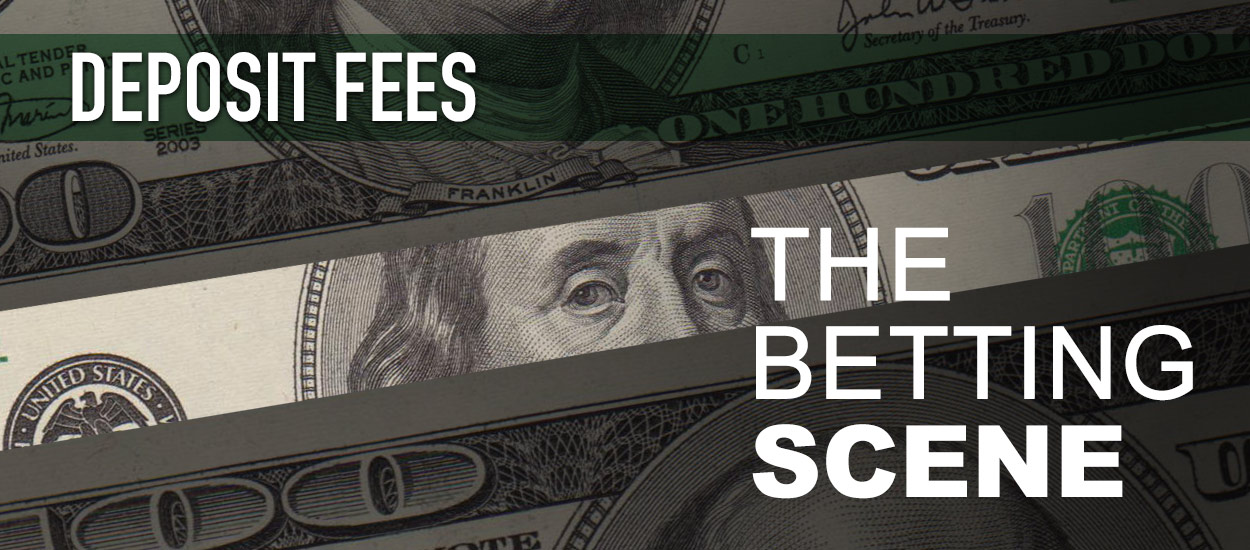Credit card fees are the norm when gambling online
For nearly two decades online sportsbooks were willing to do just about anything to get a client to deposit funds. In the early 2000s, the competition was stiff and huge sportsbooks were willing to almost pay bettors to join and send in money. But not anymore. Smaller margins, a licensed market exploding in the U.S. and smarter bettors have eaten into profits and now players pay the fees required to move money into an online sports betting account.
In they heyday of offshore sportsbooks, players could send money to Costa Rica, Antigua, Curacao and even the UK via a variety of methods and for almost nothing. Sportsbooks were happy to eat the fees for deposits via Western Union, MoneyGram, wire transfers and credit cards, as long as a minimum deposit threshold was met, usually $300. Enormous betting houses like BetonSports, The Greek and WWTS bet on volume and players losing to cover any of what were then minimal amounts of money. But that all changed after the passage of the Unlawful Internet Gaming Enforcement Act (UIGEA), which made banks and financial institutions responsible for policing money transfers to and from what the U.S. government called 'illegal offshore gambling' houses.
After the UIGEA was passed, Western Union all but disappeared form the landscape, MoneyGram became increasingly difficult to use, bank wire fees rose dramatically and suddenly, credit cards, a lifeblood of the industry in the wake of the person-to-person debacle, had to be orchestrated through sometimes shady processing companies, which either stole sportsbook funds and/or changed immense fees to circumvent the new U.S. law.
But with business booming, sportsbooks and casinos continued to absorb most fees for depositing. However, fees began to increase for making a withdrawal. Withdrawals by check had an average fee of $75, some sportsbook charged a percentage of a bank wire as a fee and person-to-person withdrawals got increasingly expensive and faced much lower limits.
Now, the days of the 'free payout' has all but disappeared. Some sportsbooks online, like BetDSI and Heritage Sports, do have a points based rewards program, where points can be exchanged for a payout done fee-free.
Crypto The top online sportsbooks began to push Bitcoin and cryptocurrency in 2018 and many thought it was because of the anonymous (at the time) nature of the transactions. In reality, it reduced the costs of sending and receiving money by 1000%. Cryptocurrency also eliminated the use of shady processing companies, cutting risk to nearly zero for online gambling companies.
The top online sportsbooks began to push Bitcoin and cryptocurrency in 2018 and many thought it was because of the anonymous (at the time) nature of the transactions. In reality, it reduced the costs of sending and receiving money by 1000%. Cryptocurrency also eliminated the use of shady processing companies, cutting risk to nearly zero for online gambling companies.
But, not all players got onboard the virtual currency train. The lack of understanding as to what a bitcoin is and the hoops that players had to jump through with setting up wallets and more 2-step verifications to send and receive money made the process confusing, time consuming and for many older players, downright impossible.
Thus many players still resort to the tried-and-true methods of funding an account. Person-to-person money transfer and credit cards.
Credit Card Fees
As profit margins eroded offshore, sportsbooks were all but forced to start charging a fee for using a credit card to deposit! Now, nearly every sportsbook located outside of the U.S. adds in a transaction fee.  Here's why. Due to the UIGEA, sportsbooks generally use credit card processors located outside of the U.S. and outside of the jurisdiction where they operate. Though these processors are not as unscrupulous as they were a decade ago, they do charge a large fee per transaction. In addition, the processors convert the USD or CAD to their local currency and then transfer the currency again when they deposit the funds into the bank account of the sportsbook. All of this adds up to MUCH greater fees than the local gas station or florist has to pay to VISA or MasterCard. Ultimately, as outlined above, the sportsbooks and casinos were forced to pass along the fees, especially in light of ever increasing charges.
Here's why. Due to the UIGEA, sportsbooks generally use credit card processors located outside of the U.S. and outside of the jurisdiction where they operate. Though these processors are not as unscrupulous as they were a decade ago, they do charge a large fee per transaction. In addition, the processors convert the USD or CAD to their local currency and then transfer the currency again when they deposit the funds into the bank account of the sportsbook. All of this adds up to MUCH greater fees than the local gas station or florist has to pay to VISA or MasterCard. Ultimately, as outlined above, the sportsbooks and casinos were forced to pass along the fees, especially in light of ever increasing charges.
We checked with several of the top 10 online sportsbooks and found that fees vary widely, and for sports bettors, every nickel saved in fees affects how many winning picks are need to be made to achieve a profit.
Fees can be eye-popping, sometimes in excess of 15%!! One great example of the fees is at industry leader Bovada. While Bovada will accept a player's first credit card deposit with no fee, subsequent deposits have a sky-high 15.9% fee added. Obviously, Bovada wants to get a player started gambling and then switch that player over to Bitcoin. One of the lowest overall fees comes from old-school outfit YouWager. YouWager does charge credit/debit card fees, but reimburse such fees when they exceed the 3% of the deposit amount and up to 10% of the deposit. Player favorite WagerWeb charges a low flat rate and adds in a dollar to every transaction, regardless of deposit amount. Sports betting giant BetOnline is right in the middle of the pack with a 7.5% processing fee on all credit or debit card deposits. A handful of top tier sportsbooks add in an extra 10%. in reality, any deposit with a credit or debit card now incurs a fee.
Bottom Line
We all pay fees for almost everything. If you don't think so, check your cable or cell phone bill. So it is not unusual to see international sportsbooks and casinos charging a credit card processing fee. Even some merchants in the U.S. are doing it now! So, we urge players who do use credit or debit cards to gamble online to check these fees. Every online gambling house has them, so a little due diligence can be the difference between winning and losing.
Or, players can dip their toes into the digital currency pool. Bitcoin has been around for more than five years now and the now sky-high price has been relatively stable for some time. And, if players transfer and use cryptocurrency quickly, the fluctuation in price become almost a moot point. And best of all, nobody charges fees for Bitcoin.








































